Chromatin/Epigenetics
Epigenetics means above genetics. It determines how much and whether a gene is expressed without changing DNA sequences. Epigenetic regulations include, 1. DNA methylation: the addition of methyl group to DNA, converting cytosine to 5-methylcytosine, mostly at CpG sites; 2. Histone modifications: posttranslational modificationEpigeneticss of histone proteins including acetylation, methylation, ubiquitylation, phosphorylation and sumoylation; 3. miRNAs: non-coding microRNA downregulating gene expression; 4. Prions: infectious proteins viewed as epigenetic agents capable of inducing a phenotype without changing the genome.
Products for Chromatin/Epigenetics
- Sirtuin(12)
- Aurora Kinase(28)
- Protein Ser/Thr Phosphatases(25)
- Histone Methyltransferase(31)
- Pim(9)
- PARP(29)
- Bromodomain(22)
- JAK(43)
- Histone Acetyltransferases(12)
- HIF(11)
- MBT Domains(1)
- HDAC(58)
- Histone Demethylases(15)
- RNA Polymerase(3)
- DNA Methyltransferase(9)
- Sphingosine Kinase-2(1)
- Cat.No. Product Name Information
-
BCC5625
UNC 2400

-
BCC3995
ME0328
ME0328 is a potent and selective ARTD3/PARP3 inhibitor with an IC50 of 0.89±0.28 μM.
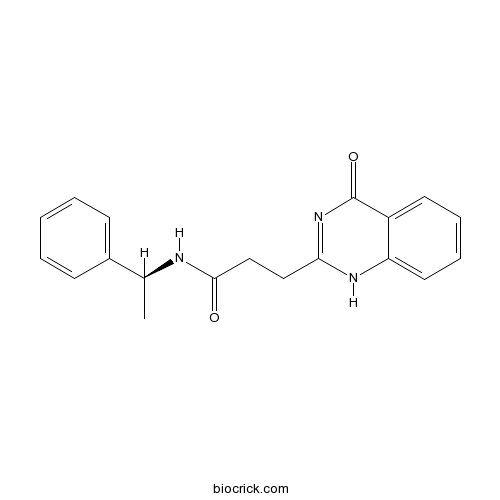
-
BCC4099
CPI-203
CPI-203 is a novel potent, selective and cell permeable inhibitor of BET bromodomain, with an IC50 value of appr 37 nM (BRD4 α-screen assay).

-
BCC5608
TC-E 5002

-
BCC2456
Calcineurin Autoinhibitory Peptide
Selective calcineurin inhibitor

-
BCC8014
UNC 0642
Potent and selective G9a and GLP inhibitor,UNC0642 is a potent and selective G9a/GLP inhibitor, inhibits G9a/GLP with an IC50 of less than 2.5 nM.
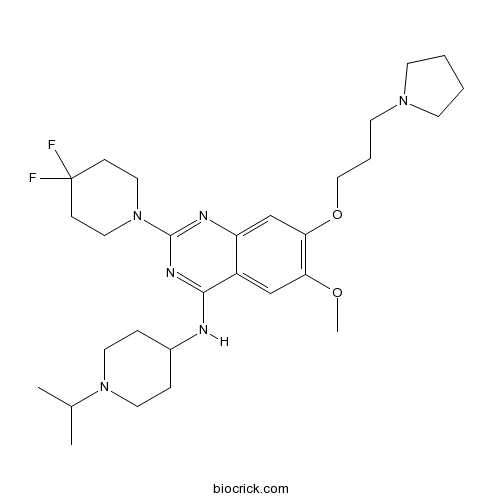
-
BCC5624
A 366
A-366 is a potent histone methyltransferase G9a inhibitor with an IC50 of 3.3 nM.

-
BCC2216
SGC 0946
SGC0946 is a highly potent and selective DOT1L methyltransferase inhibitor with IC50 of 0.3 nM; selectively kill mixed lineage leukaemia cells.

-
BCC5510
BET-BAY 002
BET-BAY 002 is a potent BET inhibitor; shows efficacy in a multiple myeloma model.

-
BCC2208
Iniparib (BSI-201)
Iniparib (BSI-201) is an irreversible inhibitor of PARP1, used in the research of triple negative breast cancer.

-
BCC2419
SGC-CBP30
SGC-CBP30 is a potent and highly selective CBP/p300 bromodomain (Kds of 21 nM and 32 nM for CBP and p300, respectively) inhibitor, displaying 40-fold selectivity over the first bromodomain of BRD4 [BRD4(1)] bound. SGC-CBP30 strongly reduces secretion of IL-17A in Th17 cells and has anti-inflammatory effects.
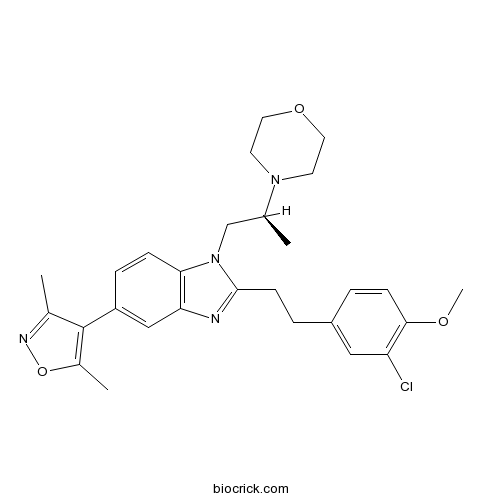
-
BCC5653
EPZ015666
EPZ015666 (GSK3235025) is an orally available inhibitor of PRMT5 with an IC50 of 22 nM.
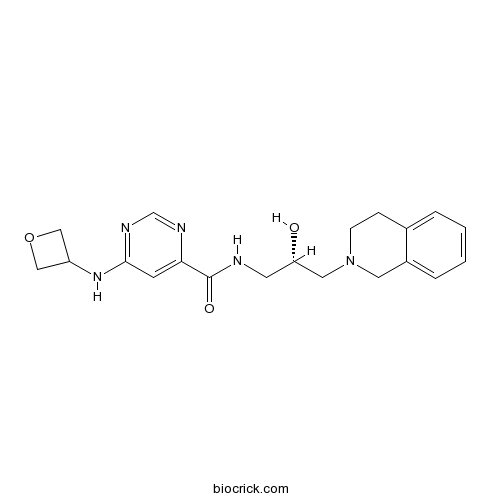
-
BCC6498
GSK2801
GSK2801 is a potent, selective, orally active and cell active acetyl-lysine competitive BAZ2A and BAZ2B bromodomains inhibitor with Kd values of 136 nM and 257 nM, respectively. GSK2801 shows >50-fold selectivity for BAZ2A/B over BRD4.

-
BCC2226
Bromosporine
Bromosporine is a broad spectrum inhibitor for bromodomains with IC50 of 0.41 μM, 0.29 μM, 0.122 μM and 0.017 μM for BRD2, BRD4, BRD9 and CECR2, respectively.

-
BCC5571
Remodelin
Remodelin hydrobromide is a novel potent and selective inhibitor of the acetyl-transferase protein NAT10.

-
BCC5561
PFI-2
PFI-2 is a a first-in-class, potent, highly selective, and cell-active inhibitor of the methyltransferase activity of SETD7 with IC50 of 2 nM, 500 fold active than (S)-PFI-2.
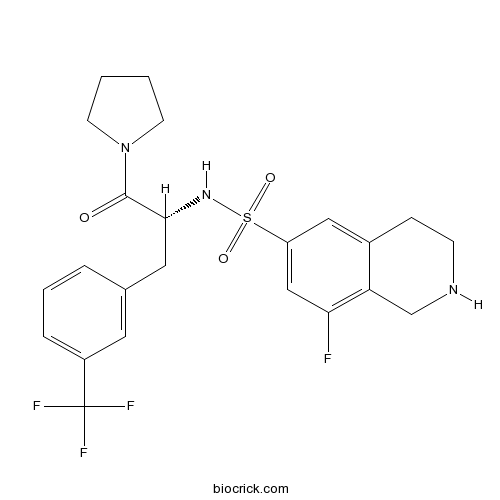
-
BCC2450
BYK 49187
PARP-1 and PARP-2 inhibitor

-
BCN2483
Ginkgolic acid C15:0
Anacardic Acid, extracted from cashew nut shell liquid, is a histone acetyltransferase inhibitor, inhibits HAT activity of p300 and PCAF, with IC50s of ∼8.5 μM and ∼5 μM, respectively.
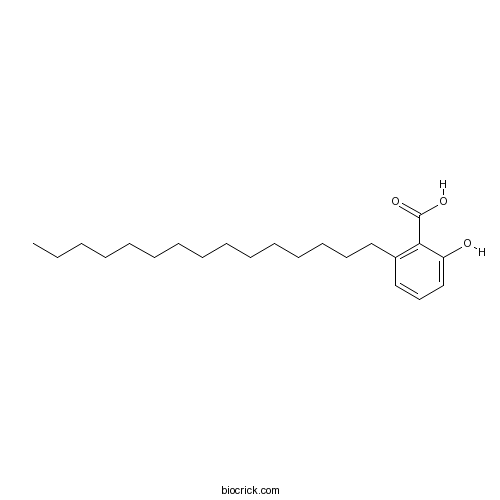
-
BCC6543
SGC707
SGC707 is a first-in-class PRMT3 chemical probe which is a potent, selective, and cell-active allosteric inhibitor of PRMT3 with IC50 of 31 nM.

-
BCC2466
Alexidine dihydrochloride
Alexidine dihydrochloride is an anticancer agent that targets a mitochondrial tyrosine phosphatase, PTPMT1, in mammalian cells and causes mitochondrial apoptosis. Alexidine dihydrochloride has antifungal and antibiofilm activity against a diverse range of fungal pathogens.

-
BCC8008
TC-E 5003
Selective PRMT1 inhibitor

-
BCC5147
CCT007093
CCT007093 is an effective PPM1D inhibitor that selectively reduces viability of human tumour cell lines.

-
BCC2437
1,2,3,4,5,6-Hexabromocyclohexane
Inhibits JAK2 autophosphorylation

-
BCC2470
Mithramycin A
Plicamycin is a selective specificity protein 1 (Sp1) inhibitor. Plicamycin inhibits the growth of various cancers by decreasing Sp1 protein.

-
BCC1133
Lomeguatrib
Lomeguatrib is a O6-methylguanine-DNA methyltransferase (MGMT) inhibitor, with IC50s of 9 nM in cell-free assay and ∼6 nM in MCF-7 cells.

-
BCC1667
JAK2 Inhibitor V, Z3
NSC 42834 (JAK2 Inhibitor V), a novel specific inhibitor of Jak2, inhibits Jak2-V617F and Jak2-WT autophosphorylation in a dose-dependent manner but was not cytotoxic to cells at concentrations that inhibited kinase activity.

-
BCC7791
Tranylcypromine hydrochloride
Tranylcypromine is a monoamine oxidase inhibitor, which inhibits CYP2A6 with Ki of 0.08 μM and 0.2 μM in cDNA-expressing microsomes and Human Liver Microsomes, respectively.
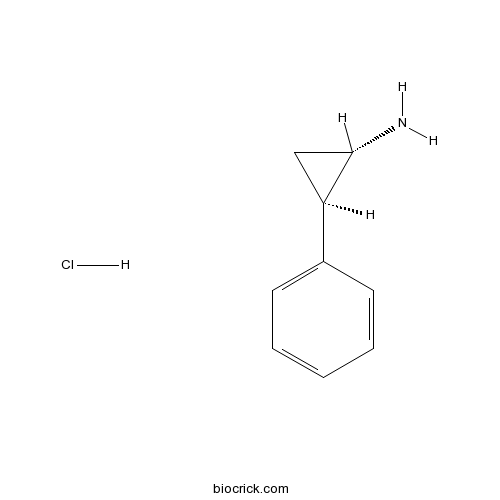
-
BCC1668
JANEX-1
JANEX-1 (WHI-P131) is a potent and specific JAK3 inhibitor (estimated Ki=2.3 μM). JANEX-1 (WHI-P131) shows potent JAK3-inhibitory activity (IC50 of 78 μM), does not inhibit JAK1 and JAK2.

-
BCC1829
OTX-015
Birabresib (OTX-015) is a potent bromodomain (BRD2/3/4) inhibitor with IC50s ranging from 92 to 112 nM.

-
BCC2459
DL-AP3
Phosphoserine phosphatase inhibitor

-
BCC2056
WHI-P97
WHI-P97 is a rationally designed potent inhibitor of JAK-3.
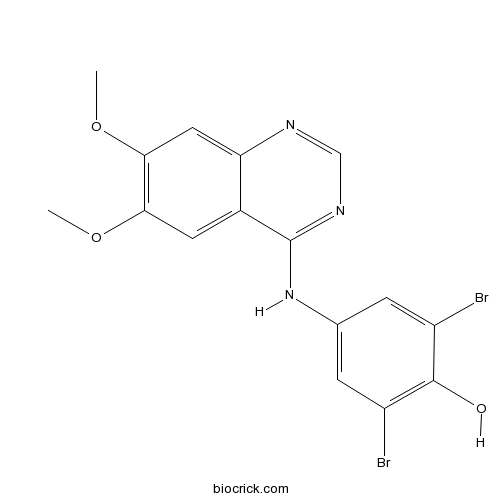
-
BCC1400
Bardoxolone methyl
Bardoxolone methyl (NSC 713200; RTA 402; CDDO Methyl ester) is a synthetic triterpenoid compound with potential antineoplastic and anti-inflammatory activities, acting as an activator of the Nrf2 pathway and an inhibitor of the NF-κB pathway.

-
BCC7533
VULM 1457

-
BCN2169
5-Aza-2'-deoxycytidine
Decitabine (5-Aza-2'-deoxycytidine) is a deoxycytidine analogue antimetabolite and a DNA methyltransferase inhibitor. Decitabine incorporates into DNA in place of cytosine can covalently trap DNA methyltransferase to DNA causing irreversible inhibition of the enzyme. Decitabine induces cell G2/M arrest and cell apoptosis. Decitabine has potent anticancer activity.

-
BCC2469
TCS 401
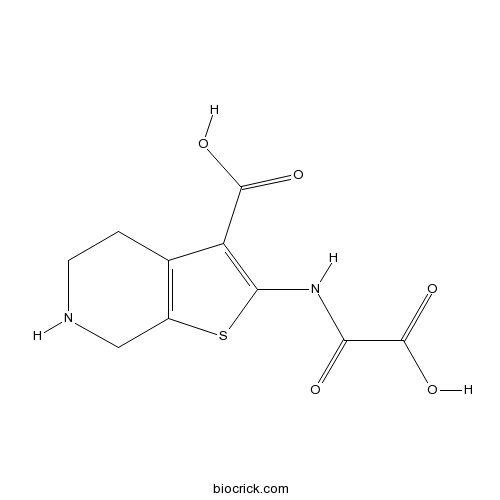
-
BCC2463
NFAT Inhibitor
Inhibitor of calcineurin-mediated NFAT activation,NFAT Inhibitor is a selective inhibitor of calcineurin-mediated dephosphorylation of nuclear factor of activated T cells (NFAT).

-
BCC2429
Chaetocin
Chaetocin is a specific inhibitor of the histone methyltransferase (HMT) SU(VAR)3-9 with an IC50 of 0.6 μM for SU(VAR)3-9. It also inhibits thioredoxin reductase (TrxR) with an IC50 of 4 μM.

-
BCC4012
Rucaparib (free base)
Rucaparib (AG014699) is an inhibitor of PARP with Ki of 1.4 nM for PARP1 in a cell-free assay, and also shows binding affinity to eight other PARP domains.

-
BCC2451
DR 2313
PARP-1 and PARP-2 inhibitor
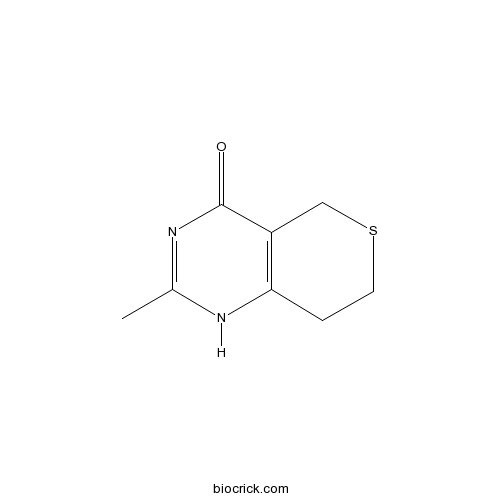
-
BCC5146
Inauhzin
Inauhzin is a dual SirT1/IMPDH2 inhibitor, and acts as an activator p53, used in the research of cancer.
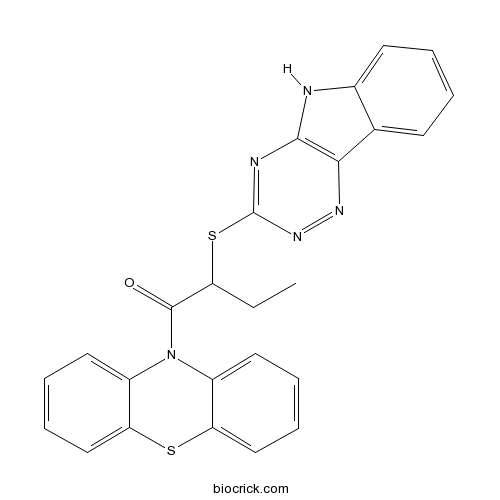
-
BCC2458
Ceramide
Ser/Thr protein phosphatase activator

-
BCC1130
5-Azacytidine
5-Azacytidine (Azacitidine; 5-AzaC; Ladakamycin) is a nucleoside analogue of cytidine that specifically inhibits DNA methylation. 5-Azacytidine is incorporated into DNA to covalently trap DNA methyltransferases and contributes to reverse epigenetic changes. 5-Azacytidine induces cell autophagy.

-
BCC8000
L002
L002 is a potent, cell permeable, reversible and specific acetyltransferase p300 (KAT3B) inhibitor with an IC50 of 1.98 μM. L002 binds the acetyl-CoA pocket and competitively inhibits the FATp300 catalytic domain, blocks histone acetylation and p53 acetylation, and inhibits STAT3 activation. L002 has the potential for hypertension‐induced cardiac hypertrophy and fibrogenesis treatment.
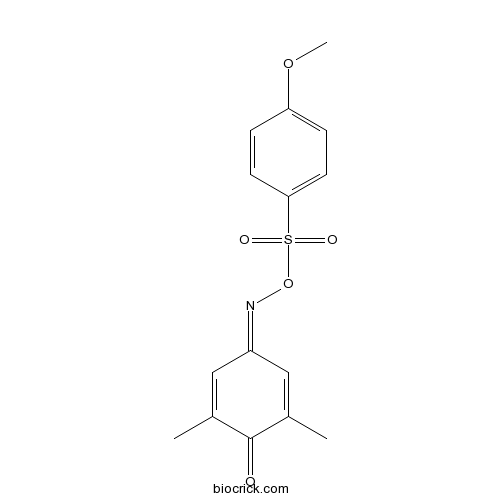
-
BCC4546
C646
C646 is a selective and competitive histone acetyltransferase p300 inhibitor with Ki of 400 nM, and is less potent for other acetyltransferases.

-
BCC2169
ZM 447439
ZM-447439 is an aurora kinase inhibitor with IC50s of 110 and 130 nM for aurora A and B, respectively.
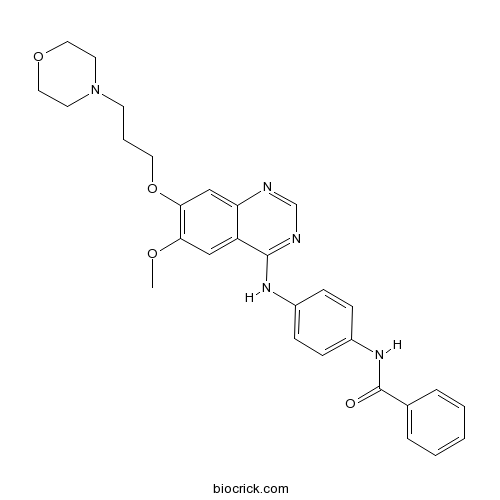
-
BCC2210
PJ34 hydrochloride
PJ34 hydrochloride is an inhibitor of PARP1/2 with IC50 of 110 nM and 86 nM, respectively.
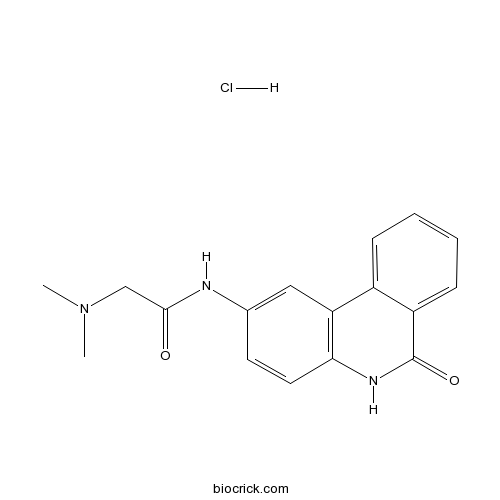
-
BCC1865
PJ34
PJ34 is a potent specific inhibitor of PARPl/2 with IC50 of 110 nM and 86 nM, respectively.
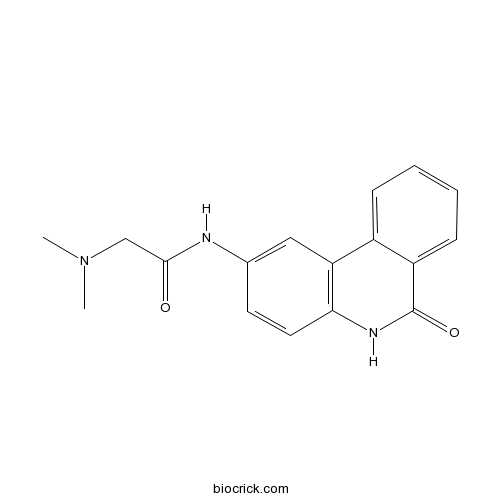
-
BCC2462
INCA-6
Inhibitor of calcineurin-substrate association
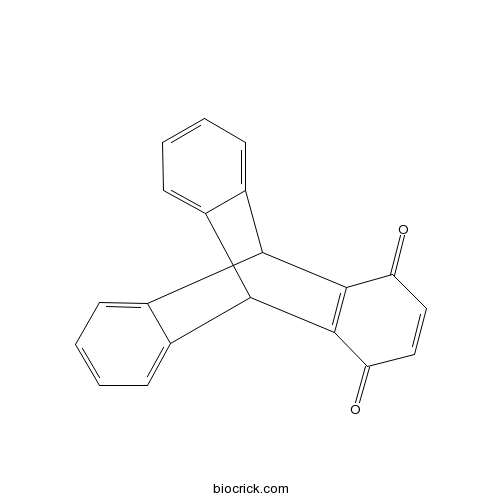
-
BCC2212
INO-1001
3-Aminobenzamide (PARP-IN-1) is a potent inhibitor of PARP with IC50 of appr 50 nM in CHO cells, and acts as a mediator of oxidant-induced myocyte dysfunction during reperfusion.

-
BCC1136
Zebularine
Zebularine (NSC309132; 4-Deoxyuridine) is a DNA methyltransferase inhibitor. Zebularine also inhibits cytidine deaminase with a Ki of 0.95 μM.
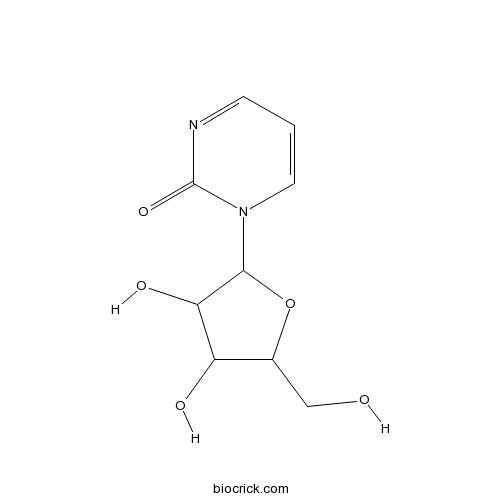
-
BCC7199
NSC 663284
NSC 663284 is a potent, cell-permeable, and irreversible Cdc25 dual specificity phosphatase inhibitor, has an IC50 for Cdc25B2 of 0.21 μM. NSC 663284 exhibits mixed competitive kinetics against Cdc25A, Cdc25B(2), and Cdc25C with Ki values of 29, 95, and 89 nM, respectively. NSC 663284 inhibits NSD2 (IC50 of 170 nM) through a direct interaction with the catalytic SET domain (Kd of 370 nM).

-
BCC2467
BVT 948
BVT948 is a protein tyrosine phosphatase (PTP) inhibitor which can also inhibit several cytochrome P450 (P450) isoforms and lysine methyltransferase SETD8 (KMT5A).
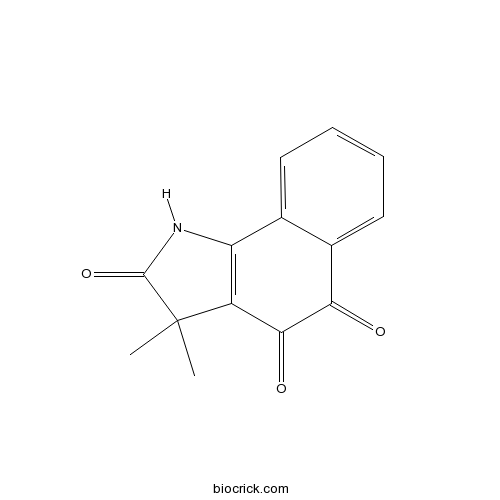
-
BCC2178
PHA-680632
PHA-680632 is an aurora kinase inhibitor with IC50s of 27, 135 and 120 nM for aurora A, B and C, respectively.

-
BCC2224
Sirtinol
Sirtinol is a sirtuin (SIRT) inhibitor, with IC50s of 48 μM, 57.7 μM and 131 μM for ySir2, hSIRT2 and hSIRT2, respectively.
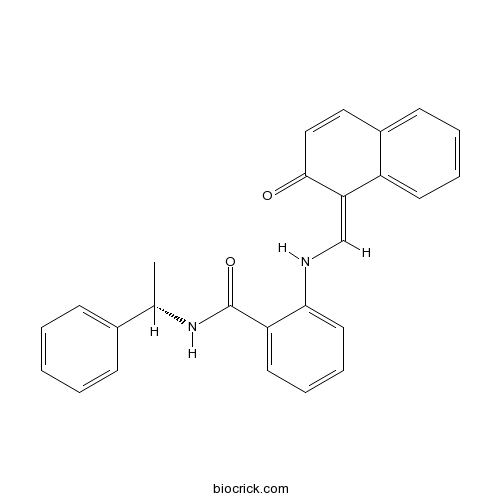
-
BCC5426
AK-7
AK-7 is a selective cell- and brain-permeable SIRT2 inhibitor, with an IC50 of 15.5 μM.

-
BCC6482
Triacetyl Resveratrol
Triacetylresveratrol, an acetylated analog of Resveratrol. Triacetylresveratrol decreases the phosphorylation of STAT3 and NF-κB in a dose- and time- dependent manner in PANC-1 and BxPC-3 cells. Anticancer effects.
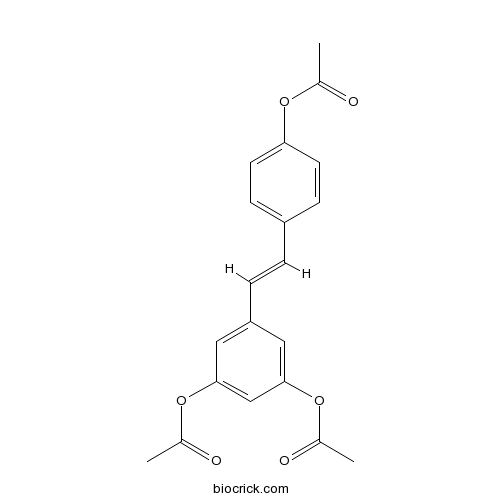
-
BCC2174
Hesperadin
Hesperadin is an ATP-competitive inhibitor of aurora B kinase with an IC50 of 250 nM.

-
BCC2171
JNJ-7706621
JNJ-7706621 is a potent aurora kinase inhibitor, and also inhibits CDK1 and CDK2, with IC50s of 9, 3, 11, and 15 nM for CDK1, CDK2, Aurora-A and Aurora-B, respectively.
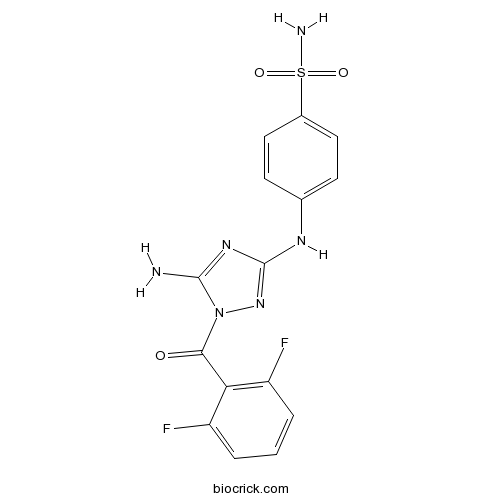
-
BCC2444
ZM 449829
Potent, selective JAK3 inhibitor

-
BCC5374
BMS-345541(free base)
BMS-345541 is a selective inhibitor of the catalytic subunits of IKK (IKK-2 IC50=0.3 μM, IKK-1 IC50=4 μM). BMS-345541 binds at an allosteric site of IKK.

-
BCC1874
Pyridone 6
Pyridone 6 is a pan-JAK inhibitor, which potently inhibits the JAK kinase family, with IC50s of 1 nM for JAK2 and TYK2, 5 nM for JAK3, and 15 nM for JAK1, while displaying significantly weaker affinities (130 nM to >10 mM) for other protein tyrosine kinases.
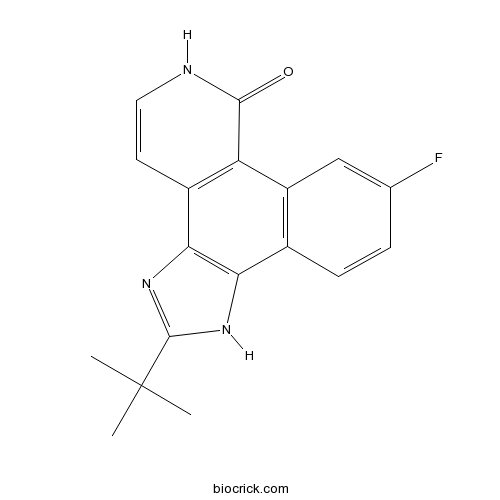
-
BCC2207
Rucaparib (AG-014699,PF-01367338)
Rucaparib phosphate (AG-014699 phosphate) is a potent and oral PARP inhibitor, with a Ki of 1.4 nM for PARP1 in cell-free assay, also showing binding affinity to eight other PARP domains.

-
BCC2192
Tofacitinib (CP-690550,Tasocitinib)
Tofacitinib is an orally available JAK3/2/1 inhibitor with IC50s of 1, 20, and 112 nM, respectively.
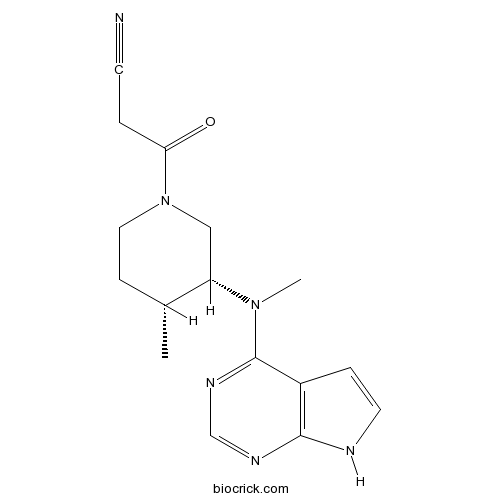
-
BCC2446
PIM-1 Inhibitor 2
Pim-1 kinase inhibitor

-
BCC1134
RG 108
RG108 (N-Phthalyl-L-tryptophan) is a non-nucleoside DNA methyltransferases (DNMTs) inhibitor (IC50=115 nM) that blocks the DNMTs active site. RG108 (N-Phthalyl-L-tryptophan) causes demethylation and reactivation of tumor suppressor genes, but it does not affect the methylation of centromeric satellite sequences.

-
BCC2448
4-HQN
4(3H)-Quinazolinone is a building block in chemical synthesis. Biologically active nitrogen heterocyclic compounds. Possesses a wide spectrum of biological properties like antibacterial, antifungal, anticonvulsant, anti-inflammatory, anti-HIV, anticancerous and analgesic activities.

-
BCC2447
TCS PIM-1 1
TCS PIM-1 1 (SC 204330) is a potent, selective and ATP-competitive Pim-1 kianse inhibitor with an IC50 of 50 nM, displays good selectivity over Pim-2 and MEK1/MEK2 (IC50s >20000 nM).

-
BCC2223
EX 527 (SEN0014196)
Selisistat (EX-527) is a potent and selective SIRT1 inhibitor with IC50 of 98 nM.

-
BCC6483
2,4-Pyridinedicarboxylic Acid
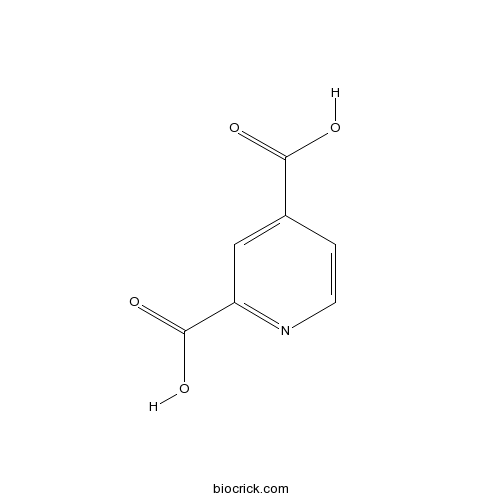
-
BCN5607
Resveratrol
Resveratrol (trans-Resveratrol; SRT501), a natural polyphenolic phytoalexin that possesses anti-oxidant, anti-inflammatory, cardioprotective, and anti-cancer properties. Resveratrol (SRT 501) has a wide spectrum of targets including mTOR, JAK, β-amyloid, Adenylyl cyclase, IKKβ, DNA polymerase. Resveratrol also is a specific SIRT1 activator. Resveratrol is a potent pregnane X receptor (PXR) inhibitor.

-
BCC3611
Nanaomycin A
Nanaomycin A is the first selective DNMT3B inhibitor with an IC50 of 500 nM. Nanaomycin A, a quinone antibiotics, reactivates silenced tumor suppressor genes in human cancer cells. Nanaomycin A inhibits in vitro growth of the human malaria parasite Plasmodium falciparum with an IC80 value of 33.1 nM.
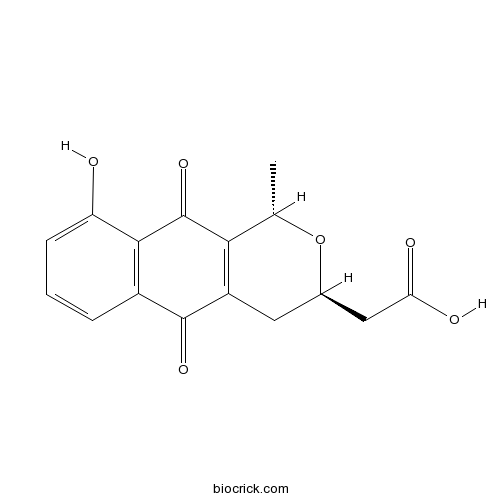
-
BCC6479
BML-210(CAY10433)
BML-210 is a novel HDAC inhibitor, and its mechanism of action has not been characterized.
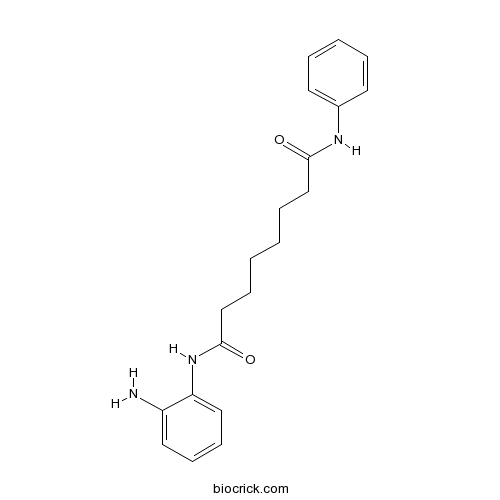
-
BCC6478
UF 010
UF010 is a potent and selective HDAC inhibitor with IC50 ~0.06 μM, 0.1 μM, 0.5 μM and 1.5 μM for HDACs 3, 2, 1 and 8, respectively.

-
BCC2189
Tofacitinib (CP-690550) Citrate
Tofacitinib citrate is an orally available JAK1/2/3 inhibitor with IC50s of 1, 20, and 112 nM, respectively. Tofacitinib citrate has antibacterial, antifungal and antiviral activities.

-
BCC6481
Sanguinarine chloride
Sanguinarine chloride, a benzophenanthridine alkaloid derived from the root of Sanguinaria Canadensis, can stimulate apoptosis via activating the production of reactive oxygen species (ROS). Sanguinarine-induced apoptosis is associated with the activation of JNK and NF-κB.

-
BCC3652
Splitomicin
Splitomicin (Splitomycin) is a selective Sir2p inhibitor. Splitomicin inhibits NAD+-dependent HDAC activity of Sir2 protein. Splitomicin induces dose-dependent inhibition of HDAC in the yeast extract with an IC50 of 60 μM.

-
BCC2468
NSC 87877
NSC-87877 is a potent inhibitor of Shp2 and Shp1 protein tyrosine phosphatases (SH-PTP2 and SH-PTP1), with IC50 values of 0.318 μM, 0.355 μM shp2 and shp1, respectively. NSC-87877 also inhibits dual-specificity phosphatase 26 (DUSP26).
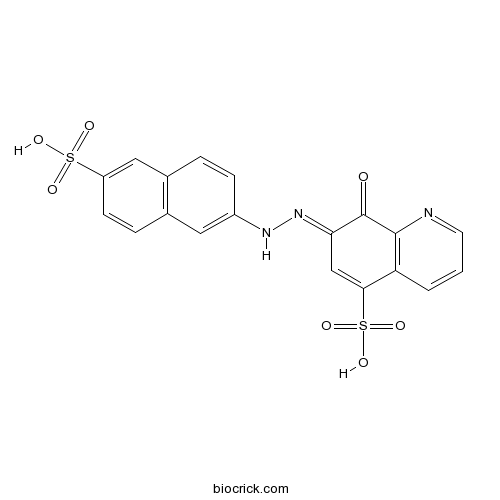
-
BCC4016
Nanaomycin C

-
BCC6192
IOX 1
IOX1, 5-Carboxy-8-hydroxyquinoline, is a potent broad‐spectrum inhibitor of 2OG oxygenases, including the JmjC demethylases. IOX1 inhibits KDM4C, KDM4E, KDM2A, KDM3A and KDM6B with IC50 values of 0.6 μM, 2.3 μM, 1.8 μM, 0.1 μM and 1.4 μM, respectively. IOX1 also inhibits ALKBH5.
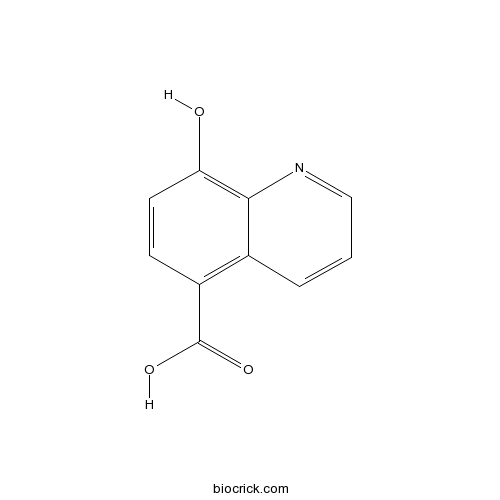
-
BCC6443
C7280948
C-7280948 is a selective and potent protein methyltransferase1 (PRMT1) inhibitor with an IC50 value of 12.75 μM.

-
BCC5506
PTP1B-IN-1
PTP1B-IN-1 is a potent protein tyrosine phosphatase-1B (PTP1B) inhibitor with IC50 of 1.6 mM; 1,2,5-thiadiazolidin-3-one-1,1-dioxide scaffold for derivatives synthesis.
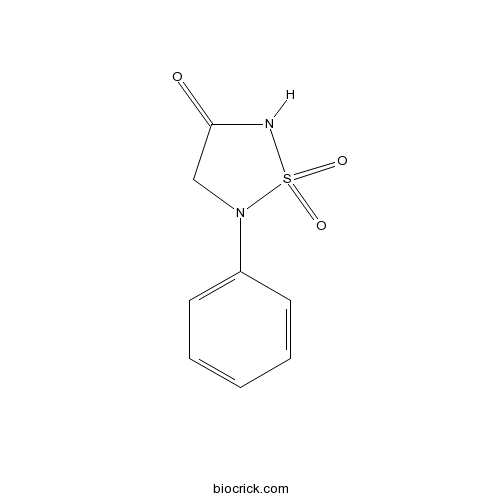
-
BCC3636
5-(3-Chlorophenyl)-N-[4-(morpholin-4-ylmethyl)phenyl]furan-2-carboxamide
CID 2011756 is an ATP competitive PKD inhibitor, with an IC50 of 3.2 µM for PKD1 in cell free assay, and also shows cellular pan-PKD inhibitory activity against PKD2 and PKD3 (IC50, 0.6 and 0.7 µM, respectively). CID 2011756 also has antitumor activity.
![5-(3-Chlorophenyl)-N-[4-(morpholin-4-ylmethyl)phenyl]furan-2-carboxamide](/media/images/struct/BCC3636.png)
-
BCC2167
VX-680 (MK-0457,Tozasertib)
Tozasertib (VX 680; MK-0457) is an inhibitor of Aurora A/B/C kinases with Kis of 0.6, 18, 4.6 nM, respectively.

-
BCC1892
Reversine
Reversine is a novel class of ATP-competitive Aurora kinase inhibitor with IC50s of 400, 500 and 400 nM for Aurora A, Aurora B and Aurora C, respectively.
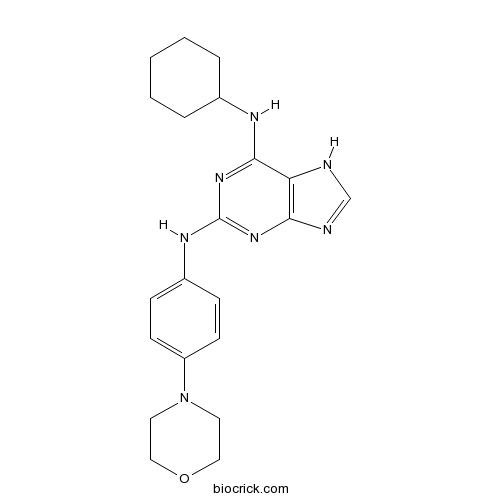
-
BCC2453
JW 55
JW 55 is a potent and selective β-catenin signaling pathway inhibitor, which functions via inhibition of the PARP domain of tankyrase 1 and tankyrase 2 (TNKS1/2). JW 55 decreases auto-PARsylation of TNKS1/2 in vitro with IC50s of 1.9 μM and 830 nM respectively.

-
BCC6502
PX-478 2HCl
PX-478 is an antitumor inhibitor of hypoxia-inducible factor-1α (HIF-1α).

-
BCC5622
IWP 12

-
BCC2181
CYC116
CYC-116 is a potent aurora A and aurora B inhibitor with Kis of 8 and 9 nM, respectively.
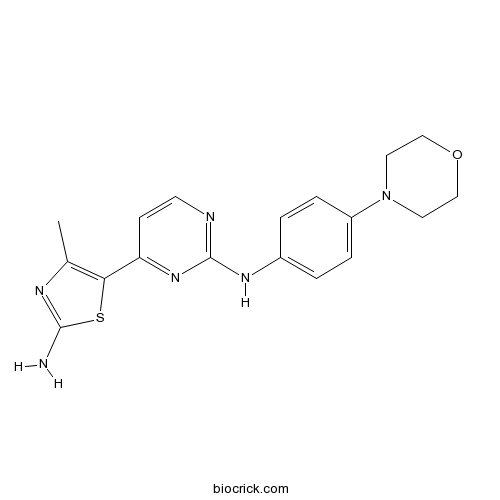
-
BCC1393
AZD1152
AZD1152 is a pro-drug of Barasertib-hQPA, which is a highly selective Aurora B inhibitor with IC50 of 0.37 nM in a cell-free assay.
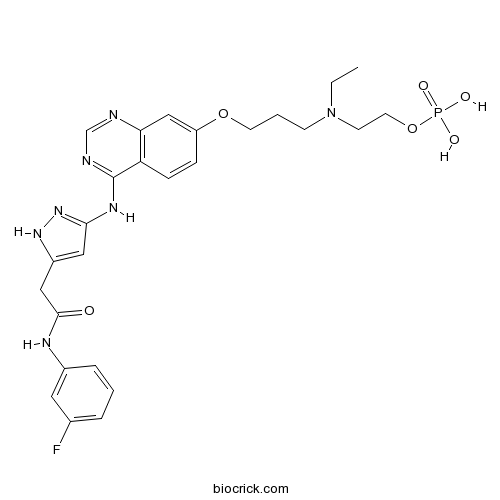
-
BCC2168
Barasertib (AZD1152-HQPA)
Barasertib-HQPA (AZD2811) is a highly selective Aurora B inhibitor with an IC50 of 0.37 nM in a cell-free assay, and shows 3700-fold selectivity for Aurora B over Aurora A.
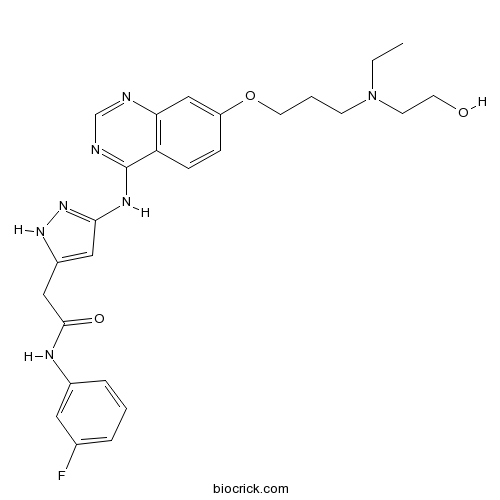
-
BCC6445
Chidamide
HDAC-IN-7 (Chidamide impurity) is an impurity of Chidamide. Chidamide is a potent and orally bioavailable HDAC enzymes class I (HDAC1/2/3) and class IIb (HDAC10) inhibitor.

-
BCC2206
Olaparib (AZD2281, Ku-0059436)
Olaparib (AZD2281; KU0059436) is a potent and orally active PARP inhibitor with IC50s of 5 and 1 nM for PARP1 and PARP2, respectively. Olaparib is an autophagy and mitophagy activator.

-
BCC2464
Okadaic acid
Okadaic acid is extracted from black sponges of the genus Halichondria. Okadaic acid is a non-comepetitive, selective and reversible serine/threonine-specific protein phosphatases 1 (PP1), PP2A and PP3 inhibitor with IC50s of 10-15 nM, 0.5 nM and 4 nM, respectively. Okadaic acid eliminate metazoan symbionts/parasites by apoptosis.
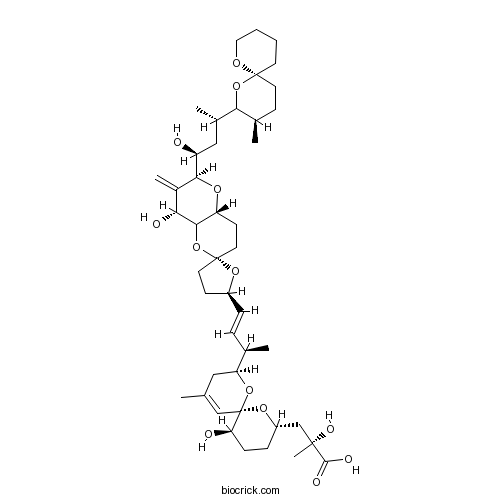
-
BCC5623
Garcinol
Garcinol, a polyisoprenylated benzophenone harvested from Garcinia indica, exerts anti-cholinesterase properties towards acetyl cholinesterase (AChE) and butyrylcholinesterase (BChE) with IC50s of 0.66 µM and 7.39 µM, respectively. Garcinol also inhibits histone acetyltransferases (HATs, IC50= 7 μM) and p300/CPB-associated factor (PCAF, IC50 = 5 μM). Garcinol has anti-inflammatory and anti-cancer activity.

-
BCC4188
Nafamostat hydrochloride
Nafamostat hydrochloride, a synthetic serine protease inhibitor, is an anticoagulant. Nafamostat hydrochloride supresses T cell auto-reactivity by decreasing granzyme activity and CTL cytolysis.

-
BCC4187
Nafamostat
Nafamostat, a synthetic serine protease inhibitor, is an anticoagulant. Nafamostat supresses T cell auto-reactivity by decreasing granzyme activity and CTL cytolysis.
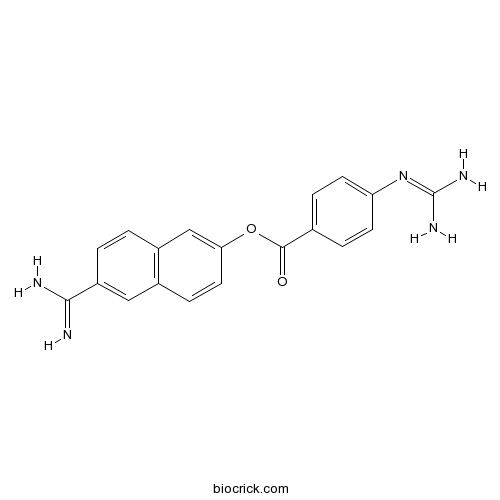
-
BCC2441
NSC 33994
JAK2 inhibitor
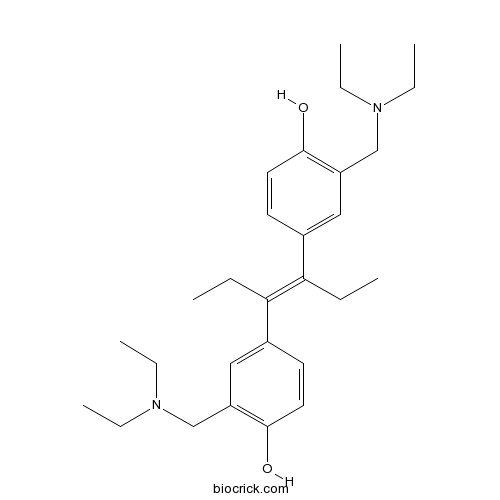
-
BCC7946
(R)-(+)-Etomoxir sodium salt
Etomoxir sodium salt ((R)-(+)-Etomoxir sodium salt) is an irreversible inhibitor of carnitine palmitoyltransferase 1a (CPT-1a), inhibits fatty acid oxidation (FAO) through CPT-1a and inhibits palmitate β-oxidation in human, rat and guinea pig.
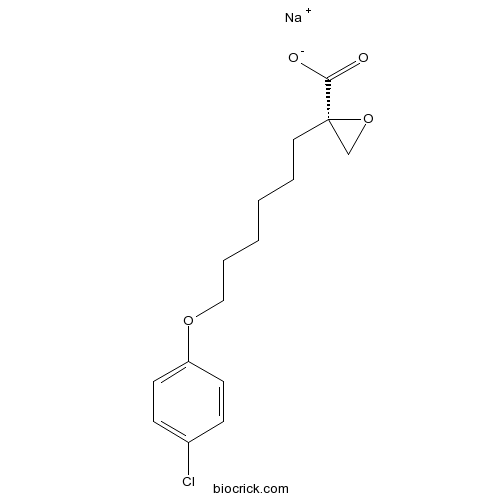
-
BCC2455
WIKI4
WIKI4 is a potent tankyrase inhibitor with an IC50 of 26 nM for TNKS2. WIKI4 potently inhibits Wnt/β-catenin signaling and that its half-maximal response dose is 75 nM. WIKI4 mediates its effects on Wnt/β-catenin signaling by inhibiting the enzymatic activity of TNKS2. WIKI4 is cytotoxic to SCLC cells with an IC50 value of 0.02 μM.

-
BCC5594
EX-527 S-enantiomer
Selisistat S-enantiomer (EX-527 S-enantiomer) is the S-enantiomer of Selisistat, with an IC50 of 123 nM for SIRT1. Selisistat S-enantiomer is much more potent than Selisistat R-enantiomer.





